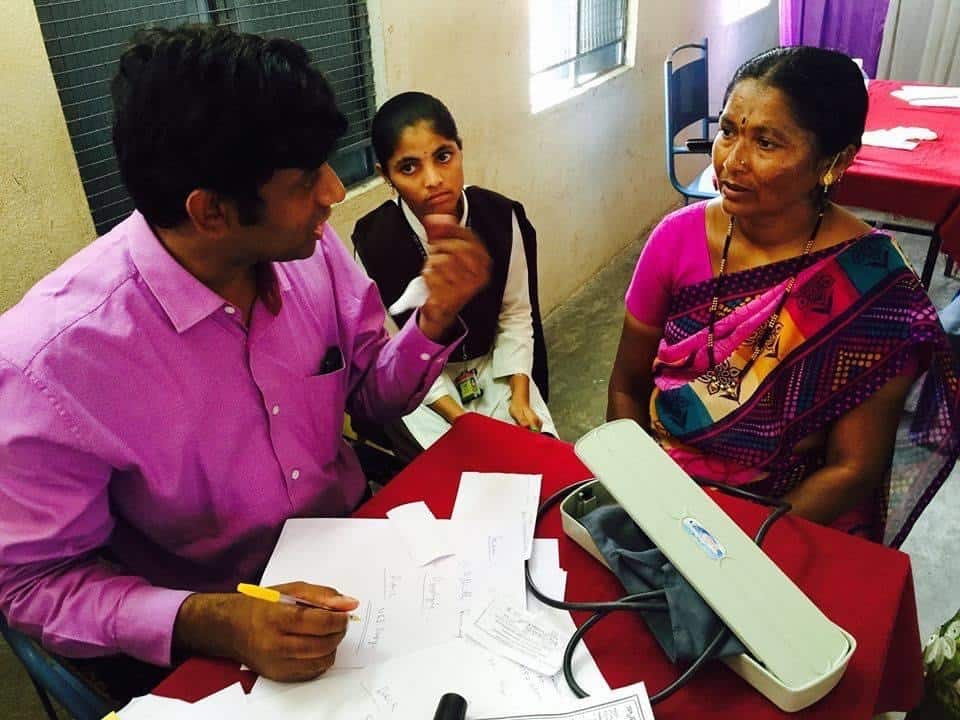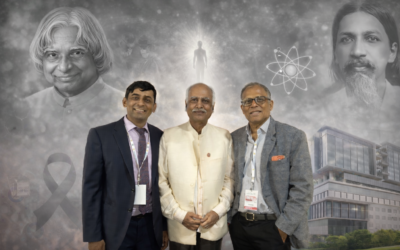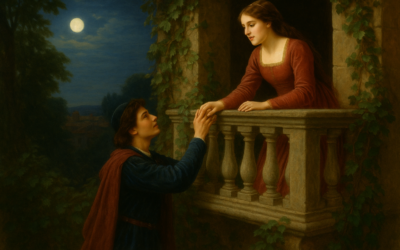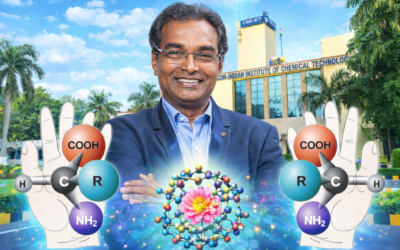Living for a Legacy

I consider meeting Dr. Sunkavalli Chinnababu as a gift that the new year 2023 brought me. Not even 50 yet, Dr. Chinnababu is a rising star in cancer surgery and is considered among the best in performing robotic-assisted surgeries in the country. A pleasing person with impeccable manners, he is full of zeal and exudes enthusiasm. He invited me to his house and at the workplace and during our several meetings I felt as if I was meeting a younger version of my mentor, Dr. APJ Abdul Kalam.
Chinnababu was born in a family of limited means in a village in the interior of the Kalyana-Karnataka region, as a second child to his parents. As goes the legend, his great-grandfather was a landlord in the West Godavari District of Andhra Pradesh, considered the “rice bowl of India.” An elephant guarded his house. As is always said about rich people of bygone eras, he was too trusty and lost his fortune to scheming relatives and friends that forced his next generation to migrate for livelihood.
Travelling westward, crossing the arid Deccan Plateau by public transport in a cascade of small trips spread over a year, they arrived at the Tungabhadra River basin to do farming, perhaps the only livelihood they knew. Putting together whatever they had, they bought two acres of land and settled for good in a village called Ashok Nagar Camp. It was a remote place; a habitat of some 300 people, not connected to any road or railway line. A small irrigation canal, emanating from the Bhadra Dam and flowing eastward, was its only connection with the rest of the world. Even the canal would dry up for three to four months every year.
Chinnababu had to walk three kilometers every day to attend the government primary school in Nalkudre, a small village near Davangere. The teachers were more like guardians to the children. Teaching was done at a slow pace with a lot of emphasis on discipline, especially taming the impulses. He enjoyed his studies. There was not even an iota of remorse about the hardship of the long walk every day. But as every contented soul eventually gets blessed, the decision of the Government of India in 1986 to establish co-educational schools, known as Model Schools, called “Navodaya Vidyalaya,” with one in each district, arrived as a boon.
The aim of these new schools was primarily to provide talented youngsters living in rural areas, with high-quality modern education, which would otherwise never reach them. Prime Minister Rajiv Gandhi even ordered free boarding and housing facilities, everyday necessities, bedding, etc. for the needy, and textbooks, stationery, and uniforms for every student. Two students from every school were invited to write an entrance examination for the Navodaya Vidyalaya in Shimoga, now called Shivamogga, and Chinnababu happened to be one of them.
The Navodaya Vidyalaya followed the PCMB (Physics, Chemistry, Mathematics and Biology) system. Therefore, there was no hesitation when deciding between Mathematics and Biology, together with Physics and Chemistry, as is the case with other educational formats. He could appear for both the Engineering and Medical entrance examinations. He secured an engineering seat at the Regional Engineering College, at Surathkal, Mangalore; as well as a medical seat at the Jagadguru Jayadeva Murugarajendra Medical College (JJMMC), Davangere, which he eventually joined “because it was nearer to his village.”
Once, alone while studying a cadaver, a dead human body dissected for teaching medicine, in the gross anatomy lab, Chinnababu had a deep spiritual experience. He felt as if the end of life was staring upon him, and suddenly realized that each cadaver was still a person. It was just that the “act” in the world was concluded for him. If this was what we all turn into at the end, what must one live for, he pondered. And he could sense the Immortal Spirit inside, which was making him work through people alive to extend what had already been done, into what further needed to be done. That day, Chinnababu took a decision to live for a legacy – not money, power, or fame, but to make things better for the coming generations.
Dr. Chinnababu started finding new meaning in events and experiences with his teachers and patients. He realized the truth of the saying of French microbiologist Louis Pasteur (1822 –1895) that luck always favored the prepared, or that chance favors the prepared mind; or even better, of Seneca, a philosopher of ancient Rome, who defined luck as the intersection of preparation and opportunity. He did his master’s in general surgery from Government Medical College, called GMC, Surat, and super specialty in Surgical Oncology from the Gujarat Cancer and Research Institute (GCRI), a state-owned cancer research institute in Ahmedabad.
In 2007, Dr. Chinnababu started practicing at the Kamineni Hospital in Hyderabad. In May 2009, he attended the American Society of Clinical Oncology (ASCO) in Orlando, Florida, and rubbed shoulders with world leaders there in oncology. Inspired by the discussions on whether experimental cancer therapies should be available outside clinical trials, Dr. Chinnababu took a sabbatical and got trained at the Long Beach Cancer Center, Los Angeles, and the Memorial Sloan Kettering Cancer Center, New York, investing all his savings in the process. Renowned head and neck surgeon Dr. Jatin Shah, and oncologist Dr. Ashwin M. Shah became his role models.
In 2010, Chinnababu created a company, ClinSync Clinical Research Pvt. Ltd., with the aim to synchronize clinical research with drug development, with oncologist Dr. Suresh Attili, Dr. Suresh Kamireddy, and Kiran Avacha, at the Hartford HealthCare Cancer Institute. They succeeded in creating many affordable indigenous drugs used in cancer treatment, notably Imatinib and Capecitabine. Moved by the plight of a widow with children of a 26-year-old man who died of tobacco-induced esophageal cancer, who did not have money to take the dead body and perform the last rites, Chinnababu created the Grace Cancer Foundation, inviting IPS officer B. L. Sujatha Rao to lead it.
Dr. Vijay Anand Reddy, director and radiation oncologist at Apollo Cancer Institute, Hyderabad got Dr. Chinnababu an invitation to join the Institute with new equipment – a surgical robot. Together with gynecologist Dr. Rooma Sinha, they made an incredible team in driving the robotic program in India.
Working with Dr. Subhash, a doctor in Nizamabad, every Friday since 2009, Dr. Chinnababu goes there to attend to cancer patients who have no means to travel to Hyderabad and pay for costly treatment at super specialty hospitals. Eventually, he adopted the Indur Cancer Hospital and established the only community cancer center for five districts in north Telangana, including a state-of-the-art linear accelerator, and radiotherapy machine. Dr. Chinnababu also organizes the Global Grace Cancer Run every year to create awareness about the prevention of cancer, which is indeed very effective to keep away cancer, the brutal king of all maladies. On October 9, 2022, in the fifth edition of the Run, 10,00,00 people participated across 130 nations.
What drives Dr. Chinnababu to learn new treatment modalities at the world’s best centers, perform a cancer surgery a day for the last 15 years, travel to Nizamabad every Friday, and indulge in clinical research to make medicines affordable? His answer is, repaying for the benediction of getting a human birth. The education, privileges, and love and respect that he receives must be paid for by serving the poor and needy. And above all, by creating a legacy, laying a path that younger doctors may tread in their careers.
MORE FROM THE BLOG
Those Who Transcend the Known
The best part of my career has been meeting eminent people and learning—often quietly—about the many facets of human excellence—something missed by those who pursue excellence in their own fields and live within their silos and echo chambers. Even now, when I travel...
The Alchemy of the Balcony
I have been deeply engrossed in reading Shakespeare for a while. It remains one of the most astonishing paradoxes in literary history that Romeo and Juliet—a drama pulsing with murder, deception, impulsive rebellion and ethical transgression—has been remembered across...
A Scientist and a Gentleman
In every civilisation, there are two measures of success. One is public and noisy—titles, awards, positions, headlines, and the temporary glow of importance. The other is almost invisible: the quality of a human being. History remembers the first for a moment and the...





Truly inspiring story of Dr Chinnababu and extremely thankful to you Sir for writing about him and his journey. In todays world where everything is driven by money and with healthcare also in some ways been affected by the venture capitalists investment, it is very refreshing to read such stories and rekindle thoughts of the actual nobility of the medical profession. Cancer is slowly becoming one of the health concerns globally but complete cure still remains elusive to a large extent. However, reading the work of Dr Chinnababu and moreso of his passion and committment to provide remedies for management and possible cure triggers the much needed hope to deal with this disease. The very fact Sir, that you could see a version of Dr APJ Abdul Kalam Sir in him is enough reason for me to believe that there will be a committed approach in finding affordable solutions to deal with this disease. Thank you Sir again for this article.
Thanks Prof Tiwariji, for bringing out the noble deeds of a dedicated doctor!
Your embedded message for younger generations to create a legacy of serving the needy is inspiring!!
Screening of cancer, especially going to the doorstep of people, is fraught with problems. What do we do after detecting the cancer early? Who will take care of the treatment ?
In Greek mythology, Tiresias was blinded by Athena after he saw her bathing. Chariclo his mother begged her to help him, so Athena, instead of restoring his ability to see the physical world, gave him the ability to see the future.
Tiresias lamented saying O Goddess knowing the future with no capacity to change is indeed even a bigger curse than the blindness.
Firstly, thank you for introducing Dr S. Chinnababu. We most acutely need “young Kalams.” A growing number of new cancer therapies are biological molecules. Treatments such as rituximab, the first monoclonal antibody for a cancer indication, presented an important improvement of leukaemia prognostic, that is considered “standard of care” today. Biosimilar medicine versions of rituximab and other agents, such as trastuzumab and bevacizumab are contributing to extended treatment options for the healthcare community.
The cost of cancer therapy is increasing as more targeted therapies come to market, creating equitable access issues. Over the next 10 years many more biological “standards of care” are set to lose market exclusivity, opening to off-patent competition from biosimilar medicines in the field of oncology. More use of biosimilar medicines can improve patient access to oncology medicines and other healthcare products and services via better and more informed use and improve healthcare budget sustainability. India must lead this area for the 4 billion poor people of the world.
Dear Sir, Thank you so much for bringing out the truly inspiring story of Dr Chinnababu. There are a very few doctors who serve the people with so much dedication and selflessly.
If Dr Chinnababu can approach some of the corporates who are in the Govt sector, they definitely will come forward and extend their support as part of the CSR. During my stint as Director HR in BEL, Kidwai memorial Hospital Director Dr Ramchandru had approached BEL with a simple letter and he had requested for a surveillance Van with all facilities to detect the cancer in the early stage for village women and BEL gave a very well equipped lab on the move so that the village level women get the chance get themselves tested regularly.
Since the present Government at the Centre encourages such dedicated services, I am sure with your reach, can help Dr Chinnababu to reach his goal and serve the society at large.
I wish that people like Dr Chinnaabu will grow in numbers and the people at large get benefitted.Thank you once again for an inspirational story sir.
Sir, a very thoughtful article on how individual determination helps society. We need hundreds of Dr Chinnababu in every medical specialty.
India has embarked on an ambitious plan to cut dependence on China for key raw materials as it seeks to become self-sufficient in its quest to be the “pharmacy of the world.”
However, India’s $42 billion pharmaceutical sector is heavily dependent on China for key active pharmaceutical ingredients or API — chemicals that are responsible for the therapeutic effect of drugs.
With India’s dependence on China at as much as 90% for certain drugs, how will it ever happen?
Respected Sir, sometimes the truth comes out from the most unexpected source. The subject of the spiraling costs of cancer medicines and their implications that have frequently been highlighted the world over and in India while celebrations of generic drugs helping poor go on, prices of new life saving medicines remains exorbitant and out of reach for most of the people.
“Cancer Care Plan and Management” Report by the Indian Parliamentary Standing Committee on Health says, “about 40% of cancer hospitalization cases are financed mainly through borrowings, sale of assets and contributions from friends and relatives”. This situation has arisen, according to the Committee, because “even average out-of-pocket spending on cancer care is too high” and “spending for cancer care in private facilities is about three times that of public facilities”.
The appalling treatment cost has seriously impacted survival rates in India and most other developing countries. In breast cancer, the five-year survival rates in India and South Africa are estimated to be 65% and 45%, respectively. In contrast, in high-income countries, it is nearly 90%. Blessed are doctors like Dr S. Chinnababu, who are sensitive towards their societal responsibility and making their best effort. Thank you for your wonderful blog post Sir.
Sir, I salute cancer surgeon Dr S. Chinnababu. Despite working in private sector he is sensitive to the needs of the poor cancer patients.
With 1.5 lakhs new cases of breast cancer every year amongst women and around same numbers of cancer in Gastro-intestinal tract among Indian men, cancer is very big social problem. Adding other common oral cancer Pharnyx and oral cavity (3 lakhs) in men and cervical (I lakh) in women, there is very large deficit in treatment facilities.
Two-thirds of the cancer care is provided in the private sector with the result that almost every year, six crore of India’s population goes below the poverty line because of the catastrophic healthcare related expenditure on cancer.
Increasing number of cancer patients are now surviving after receiving treatment, but they need supporting medicines life ling. It is time government launch a separate Auyshman Bharat type of insurance scheme specially designed for the cancer treatment.
Dear Sir, Greetings! Nice story of Dr. Chinababu and his team, they are doing a fair deal with God. My own brother is a plastic surgeon and has a similar struggle in his career. He is struggling to establish a burn unit in north Bihar region but not having enough savings to purchase a land and construct a world class burn unit.
Would need your guidance here to acheive his noble dream project and to serve the suffering humanity in this region. I am also helping him to get some support, let see when will we get success in establishing a hospital of its kind. Looking forward to your blessings!
Very great and good inspiration to upcoming Doctors.
Very inspiring and motivating story of Dr. Chinnababu. Thanks Prof Tiwari ji to bring it to the public.
Quite the inspiring story of Dr. Chinnababu. It’s clear why he reminded you of a younger version of your mentor, Dr. Kalam. God Bless him!
“The man who is wise enough to know the right thing to do, who is good enough to wish to do only the right thing, and who is able and strong enough to do the right thing is a truly great man “Wallace D. Wattles (1860 – 1911).
Dr. Chinnababu is indeed one great man. Thanks for bringing up his story on your blog for us to read.
Truly inspiring to the younger generation.
Deserves recognition by means of more equipment and doctors – to help him spread his knowledge, skill and….spirit of dedication.
Like the saying goes….’may his tribe increase’
Actions that intend to do good to all selflessly is a service to humanity. Needs commitment, passion and intent to Nurture and care. Our lives when amalgamate to serve others, this life joins in unison with the almighty who has blessed us this divine and caring life. May God bless all.
Hats off to Dr Chinnababu and you for bringing his story. Thank you.
This is an inspiring story of a young and purposeful life!
Thank you for sharing.
Healthy citizens are the greatest asset of any country. Great inspirational story of Dr.Chinnababu sir
Because of great personalities like Dr. Chinnababu “poor patients are still surviving with Cancer”…… God bless….
Yes, great contribution made by Dr. Chinnababu and his team. Such innovations are needed to our country.